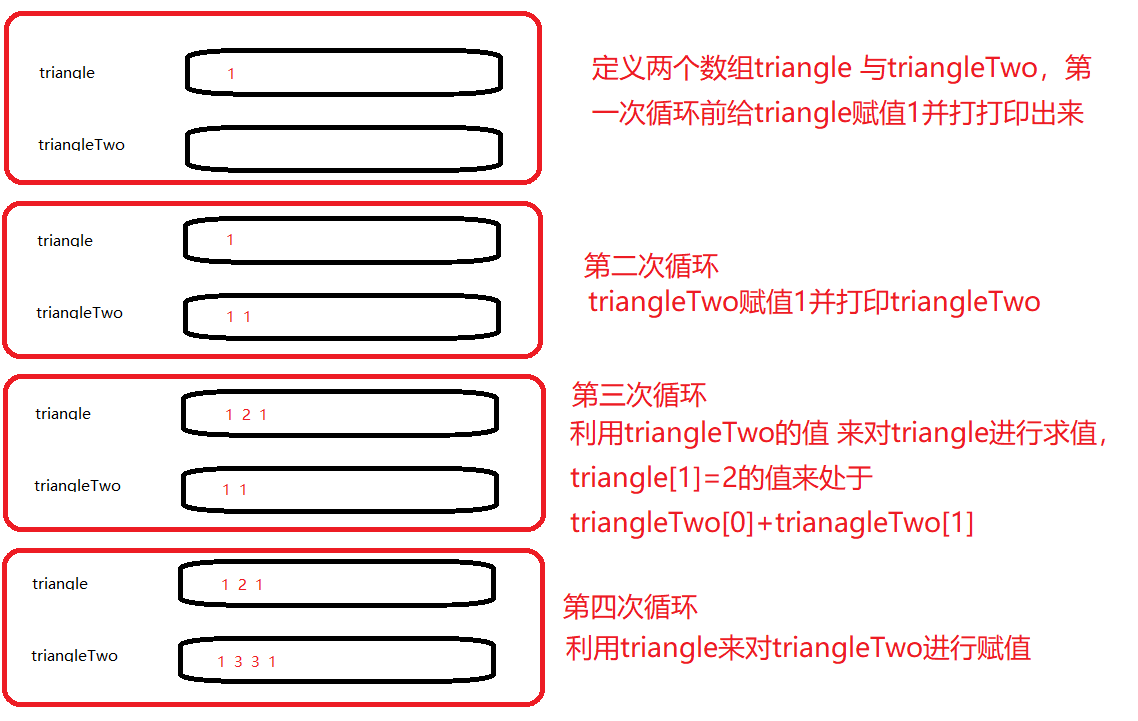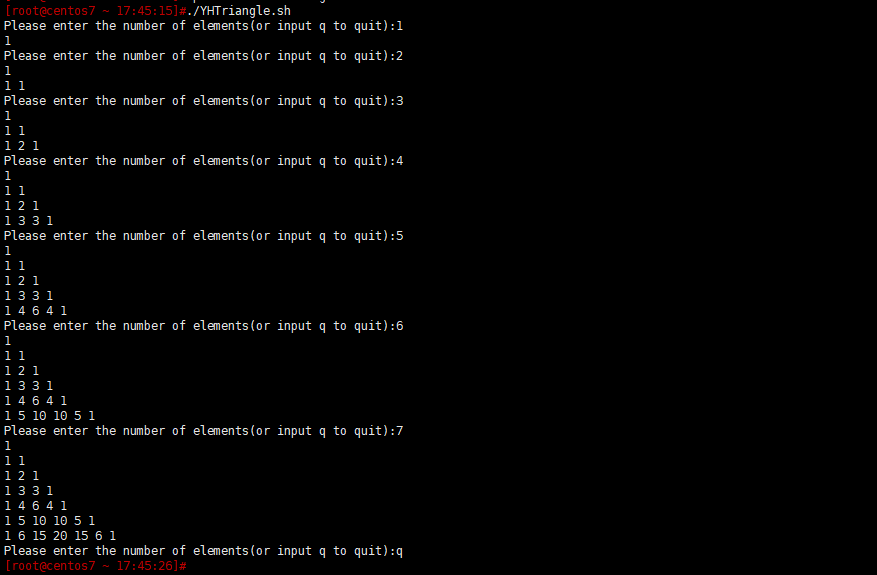According to Yang Hui triangle, the first and last elements of each row are 1, and each number is equal to the sum of the two numbers above it, and the number of elements in each row is equal to the number of rows. Using these rules, we can easily realize Yang Hui triangle!
My idea is to use two arrays, loop each other according to each other's elements to assign their own elements, and both end and end are 1.
OK I hope you can understand it. Here is the code implementation.
#!/bin/bash
declare -a triangle
declare -a triangleTwo
#Assign a value to the first element of an array
triangle[0]=1
triangleTwo[0]=1
#Vertical flag, which is used to execute a code segment in turn in a loop
flag=true
#Print 1 of triangle array first
echo $triangle
#Let's start with a five-line Yang Hui triangle.
for ((i=1;i<$1;i++)); do
#Use if else statements to loop code segments that are executed in turn
if $flag; then
#Take out the number of elements of triangle and use it to do the following number of cycles
numbers=${#triangle[*]}
#Assign a value of 1 to the last character
triangleTwo[$numbers]=1
#Determine the number of times a loop assignment is performed based on the length of triangle
for ((x=1;x<=${numbers};x++));do
#The value of triangle Two to the two adjacent elements in triangle
triangleTwo[x]=$((triangle[$[x-1]]+triangle[x]))
done
#Print triangleTwo array
echo ${triangleTwo[*]}
#Change fla g to achieve the effect of circular execution of code segments
flag=false
else
numbers=${#triangleTwo[*]}
triangle[$numbers]=1
for ((x=1;x<=${numbers};x++));do
triangle[x]=$((triangleTwo[$[x-1]]+triangleTwo[x]))
done
echo ${triangle[*]}
flag=true
fi
done
This is not enough. We can also let the user enter the number of rows and print the corresponding number of rows.
#!/bin/bash
YangHuiTriangle (){
declare -a triangle
declare -a triangleTwo
#Assign a value to the first element of an array
triangle[0]=1
triangleTwo[0]=1
#Vertical flag, which is used to execute a code segment in turn in a loop
flag=true
#Print 1 of triangle array first
echo $triangle
#Let's start with a five-line Yang Hui triangle.
for ((i=1;i<$1;i++)); do
#Use if else statements to loop code segments that are executed in turn
if $flag; then
#Take out the number of elements of triangle and use it to do the following number of cycles
numbers=${#triangle[*]}
#Assign a value of 1 to the last character
triangleTwo[$numbers]=1
#Determine the number of times a loop assignment is performed based on the length of triangle
for ((x=1;x<=${numbers};x++));do
#The value of triangle Two to the two adjacent elements in triangle
triangleTwo[x]=$((triangle[$[x-1]]+triangle[x]))
done
#Print triangleTwo array
echo ${triangleTwo[*]}
#Change fla g to achieve the effect of circular execution of code segments
flag=false
else
numbers=${#triangleTwo[*]}
triangle[$numbers]=1
for ((x=1;x<=${numbers};x++));do
triangle[x]=$((triangleTwo[$[x-1]]+triangleTwo[x]))
done
echo ${triangle[*]}
flag=true
fi
done
}
while true; do
read -p "Please enter the number of elements(or input q to quit):" line
[ "$line" == q ] && break
if [[ $line =~ ^[0-9]+$ ]]; then
YangHuiTriangle $line
else
echo "Please input correct number."
fi
done Implementation results:
Okay! Great success!
If the author has any mistakes or needs improvement, please leave a message to inform me!